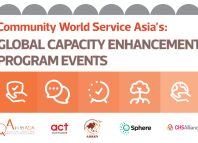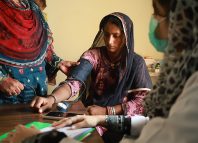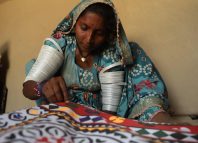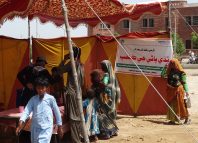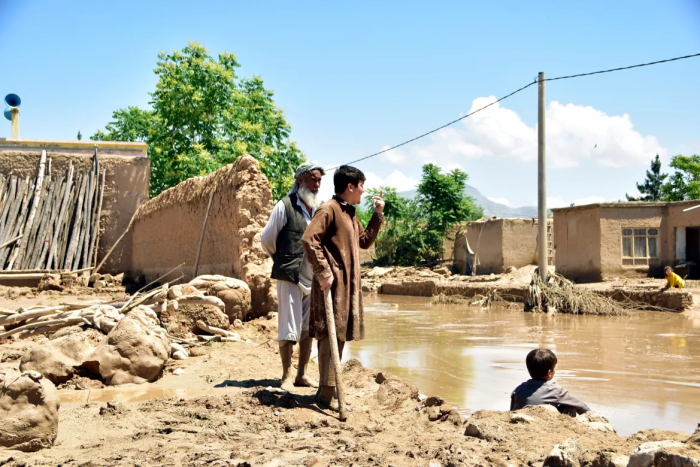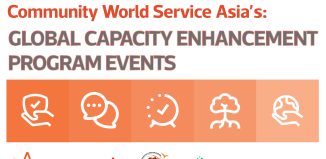Climate Catastrophe continues to claim Lives and Livelihoods in Afghanistan
Photo credit: www.aljazeera.com (AP Photo)
Ranked 6th among the countries most susceptible to climate change, Afghanistan is currently experiencing devastating floods. Over the past two months, heavy seasonal rainfall has triggered flash floods across multiple regions, with the northeastern area bearing the brunt of the impact. On May 11th and 12th, intense rainfall in Baghlan, Badakhshan, and Takhar provinces have caused severe flooding, leaving a total of 13,000 people affected since mid April.
From May 16th to May 22nd, heavy precipitation waves are forecasted across many regions of the country, with some areas expected to receive between 10 mm to over 30 mm of precipitation. This climate event, coupled with recent flooding, underscores the urgent need for life-saving and recovery support for affected populations. This also highlights the necessity for long-term resilience-building initiatives to reduce vulnerability to such events in the future
Damages (since mid-April 2024)
- Over 500 deaths and serious injuries
- 3,390 houses completely or partially damaged
- 10,000 acres of orchards destroyed
- 2,000 livestock killed
- 20km of damaged irrigation canals in Baghlani Jadid district
- Multiple districts in the three provinces remain inaccessible by road
Gender Impact:
The floods have had a disproportionate impact on women and children, with the former staying predominantly indoors during the deluge while men sought shelter in communal buildings. Among the casualties, 74 were women and 51 were children under five years old. As of May 14th, women represent a significant portion of those flood affected communities receiving treatment from mobile health teams. Critical needs in the affected areas include emergency medical care, shelter, financial assistance, essential non-food items, food support, and access to water, sanitation, and hygiene (WASH) facilities. There is a specific need for hygiene kits and sanitary products for women and girls, as well as nutritious provisions for expectant and nursing mothers. Additionally, the devastation caused by the floods has resulted in the loss of livelihoods for many women due to the destruction of livestock and farmlands.
Flood affected communities in Afghanistan are in urgent need of humanitarian assistance including:
- Food: Immediate provision of food supplies to ensure affected individuals have access to nutritious meals.
- Emergency Shelter and Non-Food Items (ESNFI): Distribution of essential items like tents, household items, and sleeping mats to provide shelter and comfort to those displaced by the flooding.
- WASH (Water, Sanitation, and Hygiene) and dignity kits: Provision of clean water, sanitation facilities, and hygiene kits to prevent the spread of diseases and maintain personal hygiene, preserving the dignity of affected individuals.
- Multi-Purpose Cash Assistance: Financial support to affected families to enable them to purchase essential items and meet their immediate needs according to their priorities.
Urgent Priority Needs
The recent floods compound Afghanistan’s vulnerability to climate-related disasters, further exacerbating the country’s humanitarian crisis. On average, 200,000 Afghans are affected by disasters each year. Between January and November 2023, as many as 344,272 people were affected by disasters throughout Afghanistan. During this period, 25 of Afghanistan’s 34 provinces experienced a disaster. Acute food insecurity is expected in northern and western parts of Afghanistan through May 2024 due to low household purchasing power, recurrent natural disasters and lack of access to income for food purchases.
Community World Service Asia’s Response:
Community World Service Asia is closely monitoring the situation on the ground, and is in close coordination with ANDMA and UN agencies. Our team in Afghanistan continues to coordinate with humanitarian and government responders on the ground to plan immediate response. CWSA has deployed its staff to affected areas in Baghlan to conduct assessments and respond to the crisis. Assessment activities have commenced, and plans are in progress to provide multi-purpose cash assistance and psychosocial support.
CWSA is appealing to raise US $ 500,000 for immediate life-saving response:
- Multi-Purpose Cash Assistance (MPCA) for 2 months for 1000 affected households à Budget: US $ 312,000
- Psychosocial support à Budget: US $ 2000
- Quality & Accountability Resources & Training à Budget: US$ 15,000
Contacts:
Shama Mall
Deputy Regional Director
Programs & Organisational Development
Email: shama.mall@communityworldservice.asia
Tele: 92-21-34390541-4
Palwashay Arbab
Head of Communication
Email: palwashay.arbab@communityworldservice.asia
Tele: 92-21-34390541-4
Source:
UNOCHA
WFP
Al-Jazeera
Center for Disaster Philanthropy

